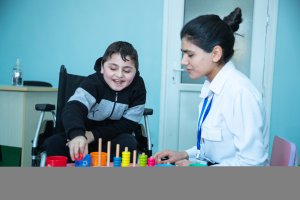
Strengthening the child protection and social protection systems in Azerbaijan
Project Description
The proposed initiative aligns with the goals set in the National Child Strategy (2020-2030) and the Action Plan for social protection and child protection. To address social protection and child protection concerns in Azerbaijan, this plan will rely on scientific research, evidence, and best practices from UNICEF's Child Protection Strategy (2021-2030) and the Global Social Protection Programme Framework. Its main focus will be to enhance the role and capabilities of non-governmental organizations (NGOs) and civil society organizations (CSOs) as a third sector. These organizations will work together with public services to carry out community-based initiatives and interventions that assist the most vulnerable children. Specific Objective
OUTCOME 2: Children in six districts/cities have access to quality social services focusing on the prevention of VAC, and the foster care model was piloted within the national child protection system
Building on the experience of the Modelling Integrated Social Services project, UNICEF in partnership with NGO’s and in coordination with the State Committee on Family, Woman and Child Affairs and the Ministry of Labour and Social Protection of Population, Ministry of Internal Affairs, Ministry of Justice, and local executive authorities, will launch quality community-based social services in six city/districts (Baku, Absheron, Ganja, Lankaran, Masalli, and Agjabadi) for prevention of violence against children.Expected Results
Outcome 2: Children in six districts/cities will have access to quality social services that focus on preventing violence against children (VAC). We will also pilot a foster care model within the national child protection system. The goal is to reform the child protection system through comprehensive interventions, including services, public awareness, and capacity building for stakeholders. This will ultimately strengthen the mechanisms for preventing, identifying, reporting, and responding to instances of VAC.
Expected Results:
Effective mechanisms will be established in six cities/districts to coordinate agencies and provide access to quality social services for preventing and raising awareness about violence against children.
The most vulnerable children affected by the conflict escalation around the Karabakh region will receive quality mental health and psychosocial support.
The childcare system of the country will be improved through enhanced reintegration efforts (family reunification), prevention of institutionalization by replicating social work services nationwide, and piloting a family-based alternative care model like foster care. Project map
VAC_Cover Photo
PROJECT DETAILS
